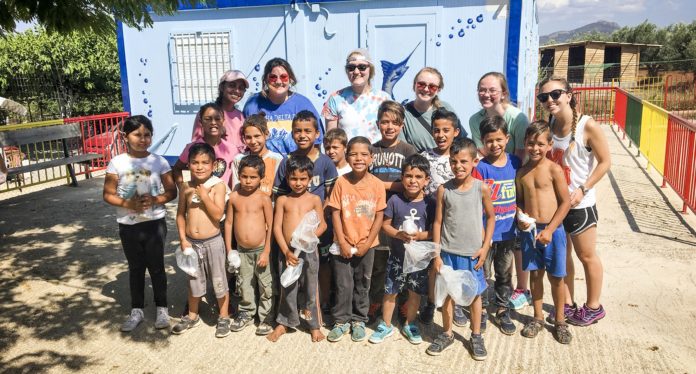They were told to stay away from those neighborhoods. They went anyway because they wanted to be advocates and make a difference.
During the three-week Mercer On Mission (MOM) trip to Greece, 10 undergraduate students and three faculty chaperones worked in Roma ghettos in Hexamilia and Zevgolatio. Mercer partnered with nonprofit organization Romani Hope for this project.
As many as 300,000 Romani, or gypsy, people live in Greece, including almost 3,000 in these two communities. They face discrimination and economic deprivation, and many live in extremely poor conditions with limited access to clean water, health care and education, said Dr. Scott Nash, Columbus Roberts Professor of New Testament in Mercer’s College of Liberal Arts.
The Mercer group conducted health surveys and tested the water inside these two ghettos. Much of the water is contaminated, and the people often die young from conditions like emphysema, diabetes, high blood pressure and stroke. The MOM participants met with local officials to share their findings and advocate for the Roma to have access to necessary services.
“These people want change, and they want a different life,” said senior Emily Poole, a double-major in sociology and law and public policy, who experienced her first Mercer On Mission trip and her first time leaving the country.
“If we can help even a little bit, then it’s worth it. These people are living in a situation that no one should have to live in.”

Dr. Nash said the meeting with officials opened doors for both the University and Romani Hope. The officials became familiar with Mercer On Mission’s work in the country and collaboration with Romani Hope, and the credibility of the nonprofit was boosted.
Senior Mary Janiga, an international business major, said she took the lead on the health surveying and helped translators fill out questionnaires. She and Amelia Britt, a senior religion major who went on the trip, will continue to do research this year with Dr. Nash on the effects of these living conditions on the communities.
The MOM participants gave 300 dental kits away and donated first aid supplies for Romani Hope to distribute, Dr. Nash said. They also spent time with the Roma children. They taught them the English alphabet, played games with them and provided health-oriented programs. They hosted clinics for tooth brushing and flossing, first aid and hand-washing as well as a shampoo and spa day, Poole said.
“(The Mercer students) learned how in a beautiful country like Greece with such a rich cultural history, there’s still great discrepancy in the ways people live,” Dr. Nash said. “The Roma really are one of the most discriminated against people anywhere.”
On the weekends, the students focused on archaeology. They researched and visited sites in Corinth, Nemea, Mycenae and Athens, including the Parthenon, Acropolis, Epidaurus and the temple of Asklepios.
The students did coursework on archaeology and religion and the ethics of globalization on the Mercer campus for two weeks prior to the trip.
This was the sixth trip to Greece since Dr. Nash launched this MOM experience in 2009. Plans are already in the works to return in the summer of 2019.
“I found out that I have a knack for global development, and that’s something I want to continue to do in the future or look into,” Janiga said. “I’ve taken away how to work with other people from different cultures that I’m not used to. If I could do it again, I’d do it in a heartbeat.”











